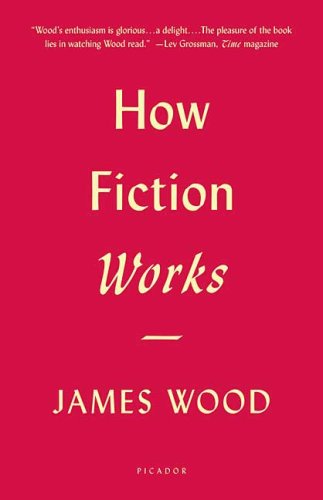
Literary critic and Harvard professor James Wood’s How Fiction Works, new in trade paperback from Picador, argues that “fiction is both artifice and verisimilitude, and that there is nothing difficult in holding together these two possibilities.” This thesis is rather broad, and really not so controversial; I’d certainly agree with it. It’s when Wood goes about showing how fiction successfully or unsuccessfully artfully represents reality that I find myself shouting at his text.
Not that I didn’t know that we were going to butt heads (to misapply a metaphor) before I began reading. After all, I was familiar enough with Wood’s aesthetic approach to literary criticism, one that eschews any notions of ideological underpinnings of a novel. In concrete terms, this means that all those discourses so (apparently) fashionable in English departments are out–you know, Marxist critiques, French deconstruction, post-colonial studies, gender readings, all that stuff. How wonderfully freeing for Wood to dispense with the baggage of history and ideology! Of course, certain novelists have felt the need to respond to these ideas, even if Wood hasn’t, leading our critic to deride a whole “genre” of “hysterical realism.” I happen to like a lot of this so-called “hysterical realism”: Pynchon, DeLillo, and David Foster Wallace spring to mind (Wood takes Wallace to task a few times in How Fiction Works, arguing that Wallace’s pseudo-business speak in “The Suffering Channel” is “fairly ugly, and a bit painful for more than a page or two”). Wood’s attack on “hysterical realism” centers on his claim that such novels privilege a (failed) attempt at a global, historical perspective at the cost of intimacy and human communication. The aesthetics here, for Wood, are precisely about how to accurately and intimately portray the world. To this end, Wood, favors writers like Henry James, Gustave Flaubert, and Chekov, and he spends much of How Fiction Works illustrating how marvelously these writers employ what he calls “free indirect style,” a type of narration where the lines between author’s and the character’s language are perfectly blended.
That Wood spends so much time on Flaubert and James (he devotes five pages to the latter’s ingenious use of the adverb “embarrassingly”) is telling when one considers the authors not represented in this book. While no literary critic should be condemned for not including every writer under the sun, it would be helpful if a book ostentatiously titled How Fiction Works took a look at something besides the work of dead white men. But there I go again, suggesting that ideology has some function in literature. Maybe I’m reaching here–to be fair, if Toni Morrison doesn’t even warrant a mention in Wood’s canon, then neither does Nathaniel Hawthorne (in fact, How Fiction Works is remarkably light on American writers in general–Melville only warrants a passing mention).
More disturbing than Wood’s limited pool of authors is his disingenuous claim that this book is for a common, everyday reader. With a hint of the anxiety of influence, he remarks that his hero Roland Barthes “does not write as if he expects to be read and comprehended by any kind of common reader,” but it must be noted that Wood will have lost anyone not fairly conversant with the history of literature by his first twenty pages.Hopefully, students new to literature will avoid Wood’s book and read something friendlier and more helpful, like Thomas C. Foster’s How To Read Literature Like a Professor.
Did I forget to mention in all of this that I liked reading this book? Like most people who love to read, both academically and for pleasure, I like a good argument, and Wood’s aesthetic criticism is a marvelous platform for my ire, especially in a world that increasingly seems to not care about reading fiction. Wood is a gifted writer, even if his masterful skill at sublimating his personal opinion into a front of absolute authority is maddening. There’s actually probably more in his book that I agree with than not, but it’s those major sticking points on literary approaches that stick in my craw. It’s also those major sticking points that make the book an interesting read. I’d like to think that I’m not interested in merely having my opinions re-confirmed. I’d recommend How Fiction Works with the caveat that the reader not fall victim to Wood’s forceful rhetoric, to the erroneous assumption that Wood’s aesthetic values somehow trump one’s own. Read this book, but don’t mistake it for a substitute for the real education that great novels can provide. “I am really talking about the real, which is at the bottom of my inquiries,” writes Wood in his introduction, but make no mistake, Wood cannot transmit the real in his criticism. It can only be found in reading the sources yourself.


